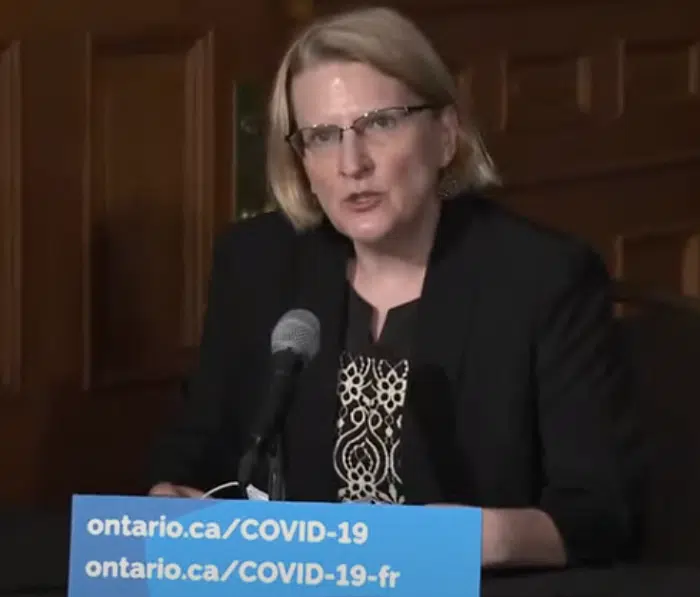
Solicitor General Sylvia Jones speaks at a press conference on April 16. (image from Premier's Office Live Stream)
The Ford government is granting police officers new powers to enforce the provincewide stay-at-home order.
Ontario’s Solicitor General Sylvia Jones says moving forward police will have the authority to “require any individual who is not in a place of residence to first, provide their purpose for not being at home, and provide their home address.”
Jones says police will also have the authority to stop a vehicle, to inquire “about an individual’s reason for leaving their residence.”
According to an Ontario government release, the new enforcement authority will be effective as of Saturday, April 17, at 12:01 a.m. It applies to police officers and other provincial offences officers.
“By issuing these new additional enforcement measures, it allows police officers to ask the person why they are not at their place of residence and what their place of residence is,” Jones explains. “… If you are not willing to comply, then you are breaking the law, and there is an option for the police officer to issue a ticket.”
Fines for violating provincial emergency orders are a minimum of $750 or $1,000 if you try to stop an officer from giving you or someone else a ticket. The maximum an individual could face is up to $100,000, and even prosecution or jail time.
Jones says the temporary enhancement of police officers’ authority will be for the duration of the stay-at-home order, which will continue until at least May 20 after Premier Doug Ford announced it is being extended for an additional two weeks.
Premier Ford did not detail these new police powers in his address Friday afternoon when outlining the extension of the stay-at-home order and several new restrictions. They were explained subsequently by the Solicitor General.
The new police powers drew condemnation from a constitutional rights and freedoms watchdog, the Canadian Constitution Foundation.
“Ontarians are essentially living under a 24 hour curfew and police will now be able to randomly stop people and vehicles and demand an explanation of why people are out living their lives,” Canadian Constitution Foundation Executive Director Joanna Baron says in a statement. “With these new police powers, Ontario is one step closer to becoming a police state.”
The Canadian Civil Liberties Association also criticized the new enforcement authority on social media, saying “the mobility rights restrictions fail to achieve constitutional proportionality.”
During the previous stay-at-home order that was issued in January, police did not have the authority to stop individuals or vehicles for the sole purpose of checking for compliance with the order.
The regulation outlining details about Ontario’s current stay-at-home order is available here.








